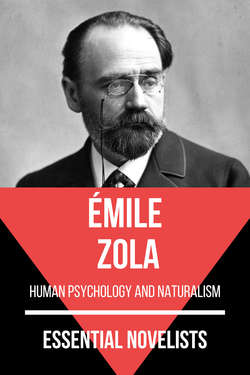Читать книгу Essential Novelists - Émile Zola - Эмиль Золя, Еміль Золя, August Nemo - Страница 3
На сайте Литреса книга снята с продажи.
ОглавлениеAuthor
ÉMILE-ÉDOUARD-CHARLES-Antoine Zola was born in Paris, France on April 2, 1840. After having moved the family to the Aix-en-Province of southern France, Zola’s engineer father died in 1847, with the youngster and his mother thus facing economic challenges.
By 1858, Zola had moved back to Paris, continuing his studies at the Lycée Saint-Louis but failing twice to receive his baccalauréat due to low grades on his exams. He struggled tremendously for a time, barely getting by, before getting a job as a clerk in 1862 with the publishing company Louis Christophe Francois Hachette. Zola had a passion for writing and worked as a freelance journalist while developing his fiction. He published his debut novel in 1865, La Confession de Claude, an autobiographical work that chronicled a man falling in love with a sex worker. The book was banned in certain circles, attracting the attention of authorities and causing Zola to lose his job.
Undeterred, Zola continued to be adventurous with his writing, publishing the grisly tale Thérèse Raquin in 1867 and Madame Férat the following year. Zola came up with the notion of writing an interconnected series of novels that would follow the lineage of a particular family during the time of Napoleon III and France’s second empire. Originally intended to run for 10 volumes, the monumental work that would be known as Les Rougon-Macquart ultimately consisted of 20 volumes, with the first book published in 1871 after being serialized and the final installment arriving in 1893. Standout titles from the series included L’Assommoir (1877), which catapulted Zola to fame, and the acclaimed Germinal(1885).
Zola was also known for being the founder of naturalism, a movement which aimed to apply scientific doctrines of the time to fictitious literary forms and relied on strict documentation of the lives and surrounding circumstances of characters, among other tenets. Zola used much of his work to give voice and substance to the miseries endured by the poor.
In 1898, Zola penned a newspaper letter “J’Accuse,” which condemned his country’s military for trying to cover up the wrongful conviction of Jewish army captain Alfred Dreyfus on espionage charges. But Zola himself ended up being put on trial for libel. He was convicted and then sentenced to a year’s imprisonment. Zola left France for England in July 1898, a man in exile, and returned to his home country in June 1899, with Dreyfus having been pardoned.
Zola died in Paris on September 28, 1902 of asphyxiation from coal gas resulting from a blocked chimney. Zola was greatly mourned and his work has inspired continued literary/scholarly analysis and an outpouring of artistic interpretations, with scores of screen adaptations having been made of his novels.
